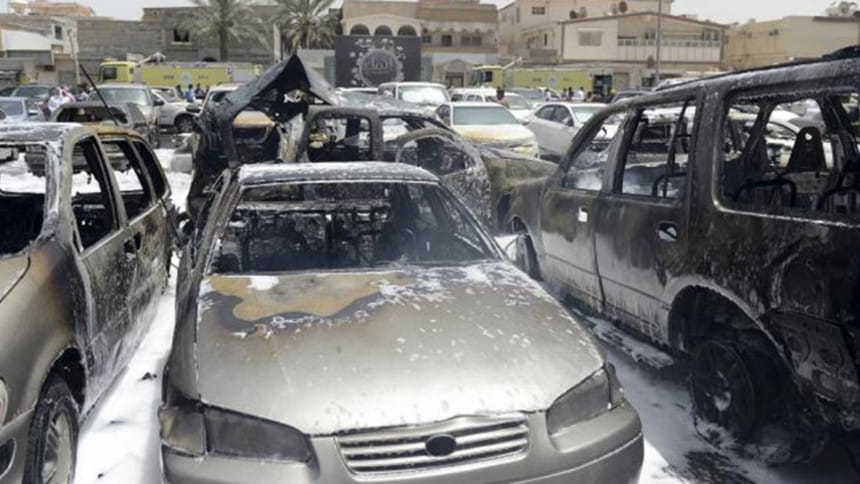IS claims blast killing four at Saudi mosque

Islamic State claimed responsibility for a bombing that killed four people at a Shi'ite Muslim mosque in eastern Saudi Arabia on Friday, the second attack claimed by the Sunni militant group in a week in the world's top oil-exporting country.
The Interior Ministry said a car exploded outside al-Anoud mosque in Dammam during noon prayers on Friday, while witnesses said a suicide bomber disguised as a woman blew himself up in the mosque's parking lot when guards stopped him from entering.
The ministry said four people were killed in the blast, which set several cars ablaze.
Residents circulated pictures of the body of a man believed to be the suicide bomber as well as pictures of black clouds of smoke billowing over a parking lot outside the mosque.
Video posted on social media showed the congregation inside the mosque reacting with shock and alarm to the noise of the explosion outside the building.
An Islamic State statement named the suicide bomber as Abu Jandal al-Jizrawi and said he had managed to reach his target despite heightened security.
Islamic State claimed responsibility for a suicide bombing last week at a Shi'ite mosque in al Qadeeh village, near al-Qatif city, that killed 21 and wounded nearly 100 in the bloodiest militant attack in the kingdom in years.
Sectarian Confrontation
Islamic State openly acknowledges it is trying to stir sectarian confrontation as a way of hastening the overthrow of the ruling Al Saud family, and has urged young Saudi Sunnis in the kingdom to attack targets including Shi'ites.
Sheikh Sabah al-Ahmed al-Sabah, emir of neighboring Kuwait, said on Wednesday sectarian strife was the most serious threat facing Muslims and called for immediate action to tackle it.
Some commentators in Saudi Arabia discussing the Qadeeh bombing have said the kingdom has not done enough to crack down on online abuse of Shi'ites, a discourse which Shi'ites say provides an incubator for violence against the minority sect.
Islamic State sympathizers exchanged photos of the scene on social media, saying the attack was targeting "rejectionsists" -- a term usually used by the militant group or al Qaeda.
Both groups view Shi'ites as heretics.
Sunni power Saudi and Shi'ite Iran are locked in a tussle for influence in the region, where wars have claimed hundreds of thousands of lives mainly in Syria, Iraq and Yemen.
State news agency SPA quoted an Interior Ministry spokesman as saying security forces became suspicious of a car parked near the mosque which exploded as they walked towards it, killing four people and setting cars beside it on fire.
One of those killed was suspected of being the driver.
Activists said young men conducting searches at the mosque began to suspect someone trying to enter the mosque dressed in women's clothes and stopped him.
They said the bomber turned away and exploded between cars, killing at least two people and setting several cars on fire.
They identified one of the victims as Abdel-Jalil Taher al-Arbash and said he had recently returned from studying in the United States.

 For all latest news, follow The Daily Star's Google News channel.
For all latest news, follow The Daily Star's Google News channel. 



Comments